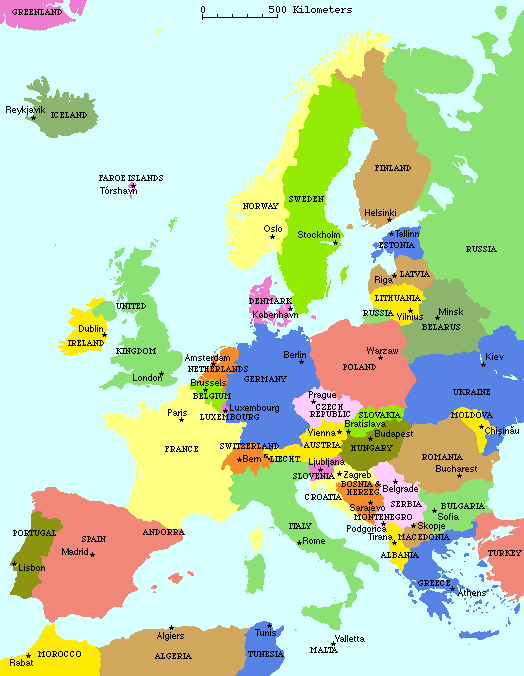....On April 9, Prince Henry, in splendid armour, rides out from Legnica to do battle with the Tatars. As he rides past the Church of the Blessed Virgin, a stone falls from the roof narrowly missing his head. This is regarded as a divine warning or, at least, an ill omen. The Prince arrays his army on level ground near the River Nysa in four ranks: the first consists of crusaders and volunteers speaking several languages, and some gold miners from Zlotoryja; the second line is made up of knights from Cracow and Wielkopolska; the third of knights from Opole; the fourth of the Grand Master of the Prussian Knights with his brethren and other chivalry; while the fifth consists of Silesian and Wroclavian barons, the pick of the knights from Wielkopolska and Silesia and a small contingent of mercenaries, all under the command of Prince Henry himself. There are many Tatar units, each more numerous and more experienced in battle; indeed, each consists of more men than the combined Polish force. Battle is joined.
The Poles attack first and their initial charge breaks the first Tatar rank and moves forward, but, when the fighting becomes hand-to-hand, they are surrounded by Tatar archers, who prevent the others coming to their assistance. These then waver and finally fall beneath the hail of arrows, like delicate heads of corn broken by hail-stones, for many of them are wearing no armour, and the survivors retreat. Now two Polish ranks are fighting three Tatar units; indeed, have overcome them, for the Polish crossbowmen protect them from the Tatar archers, but then someone from the Tatar ranks starts running hither and thither between the two armies shouting "Run, run!" to the Poles and encouragement to the Tatars. The Duke of Opole, thinking the shouts come from a friend, not an enemy, withdraws his men. When Prince Henry sees what is happening, he laments aloud, but brings up his fourth rank, which contains the best of his troops and with them is on the point of overcoming the Tatars, when a fourth and even larger Tatar force under Batu comes up and fighting is resumed. The Tatars attack fiercely, but the Poles refuse to retreat, and for a while honours are even.
Among the Tatar standards is a huge one with a giant X painted on it. It is topped with an ugly black head with a chin covered with hair. As the Tatars withdraw some hundred paces, the bearer of this standard begins violently shaking the great head, from which there suddenly bursts a cloud with a foul smell that envelopes the Poles and makes them all but faint, so that they are incapable of fighting. We know that in their wars the Tatars have always used the arts of divination and witch-craft, and this is what they are doing now. Seeing that the all but victorious Poles are daunted by the cloud and its foul smell, the Tatars raise a great shout and return to the fray, scattering the Polish ranks that hitherto have held firm, and a huge slaughter ensues.
Among those who fall are Boleslav the son of the Margrave of Moravia and the Master of the Prussian Order. Prince Henry does not desert his men. Surrounded by Tatars who are attacking him from all sides, he and a handful of others try to force their way through the enemy. Then, when he has almost won through and there are only four knights left with him, the Prince's horse, already wounded, drops dead. The Tatars, recognizing the Prince by his insignia, press after him. For a while he and his companions fight on; then his fourth knight brings him a fresh horse taken from the Prince's chamberlain. The Prince remounts and the five make another attempt to break through the enemy ranks; but once again are surrounded. Nonetheless they fight on. As the Prince is raising his arm to bring his sword down on an enemy, a Tatar thrusts his lance into the Prince's armpit and the Prince slides from his horse. The Tatars pounce on the Prince and, dragging him two bowshots clear, cut off his head with a sword, tear off all his badges and leave his corpse naked. In this great battle a number of the Polish nobility and gentry find honourable martyrdom in defence of their Faith. The saintly Jadwiga, then in Krosno, is informed by the Holy Spirit of the extent of the disaster and of the death of her son in the same hour as it happens, and tells this to a nun, called Adelaide.
Jan Iwanowic, the knight who brought Henry the horse that nearly saved him, joins forces with two of the shield-bearers and another knight, called Lucman, who has two servants with him and himself has twelve wounds. When their pursuers pause for a breather in a village a mile or so from the battlefield, the six turn and attack them, killing two of their number and taking one prisoner. After this, Iwanowic enters a Dominican monastery and lives there piously, grateful that the Good Lord has saved him from so many dangers.
Having collected their booty, the Tatars, wishing to know the exact number of the dead, cut one ear off each corpse, filling nine huge sacks to the brim. Then, impaling Prince Henry's head on a long lance, they approach the castle at Legnica (for the town has already been burned for fear of the Tatars) and display it for those inside to see, calling upon them through an interpreter to open the gates.
The defenders refuse, telling them that they have several other dukes, sons of good duke Henry, besides Henry. The Tatars then move on to Olomouc, where they camp for a fortnight, burning and destroying everything round about. Moving on again, they halt for a week at Bolesisko, and, after slaughtering many of the inhabitants, continue into Moravia......





